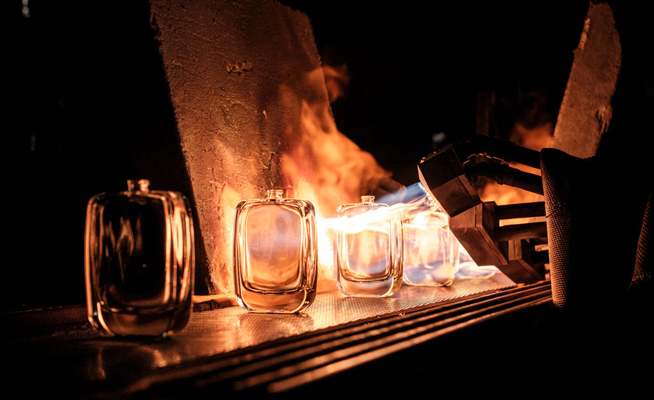The extensively developed Product Carbon Footprint (PCF) tool is a world first, and the HEINZ-GLAS Group is a pioneer in two aspects: For the first time ever, a packaging manufacturer can now accurately predict the greenhouse gas emissions generated by its products and simultaneously have the calculation tool verified for the first time in accordance with ISO standards. The experienced experts from TÜV SÜD Industrie Service GmbH were brought on board for this purpose. This is a win for customers who benefit from the perfect decision-making tool.
How large is the product carbon footprint (PCF) of a bottle, for example? How many greenhouse gases are generated in association with this package along the value chain? While other manufacturers can only give rough estimates, the HEINZ-GLAS Group from Kleintettau, Germany, can give exact information calculated down to the gram and in just five minutes. In order to be able to do this, the HEINZ-GLAS Group was the first company in the world to develop a PCF tool, a step that involved a great deal of work.
Independent verification by TÜV SÜD provides the best basis for establishing confidence.
“We lead the way when it comes to sustainability, and we’re not afraid to show it either,” said CEO & Owner Carletta Heinz confidently. “This can be seen in the history of our company which stretches back 401 years: In 1971, my grandfather built the first electric furnace in Europe. We’ve used carbon-free electricity in all German locations since 2016 and at sites in Poland and Peru since 2019. In 2021, we made a 50 percent recovery rate possible for recycled glass. And now, we’re elevating our sustainability strategy with a PCF tool that we’ve developed ourselves. This represents an important milestone in our work, we keep getting better.”
Why wasn’t a PCF tool that quickly and automatically calculates a product’s carbon footprint thought of long ago? Thomas Eidloth, who is responsible for sustainability at HEINZ-GLAS, believes the answer lies in the work involved: “It took three years of really hard work to develop the tool.”
His colleague Elisa Trebes, who is overseeing the implementation of the project, added, “An infinite amount of data had to be collected. Not just on how much energy is used directly in production or transport, instead, on all emissions for the entire company. For example, whether employees travel to work by bus or car. Or how much electricity is used in the offices. And then all this data is updated every year.”
Alongside having to collect data according to strict rules, an IT-assisted methodology had to be developed in order to accurately collate the vast number of indicators before ultimately breaking them down to one product gram.
Having to verify this type of calculation tool was uncharted territory even for the experienced experts of the verification authority TÜV SÜD Industrie Service GmbH. The development process was jointly realized in an intensive exchange and then completed in September 2022 with successful verification, as confirmed by compliance with DIN EN ISO 14067:2019 requirements.
“The PCF tool demonstrates once again how important HEINZ-GLAS takes sustainability,” stressed Eidloth. “After all, it allows you to give customers a simple yet important decision-making tool that ultimately results in resources and the environment being handled in a more conscious manner.
“For instance, if I show a customer 20 possible versions of a product in the simulator and calculate how sustainable each individual product is with the tool verified by TÜV SÜD, they will in cases of doubt go with the product that weighs less or has a higher amount of recycled glass. The PCF tool will guide customers towards opting for greater environmental protection.”






